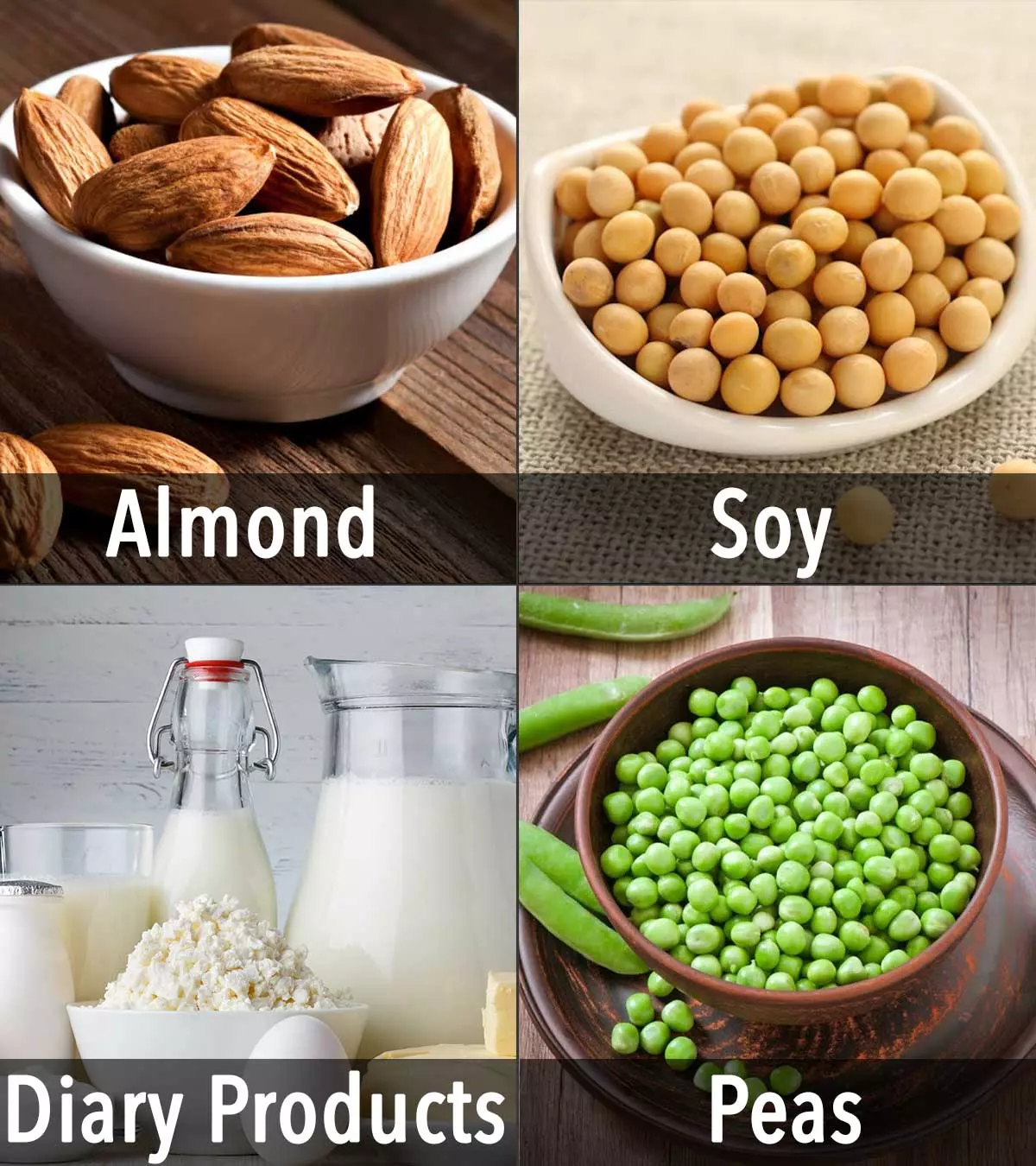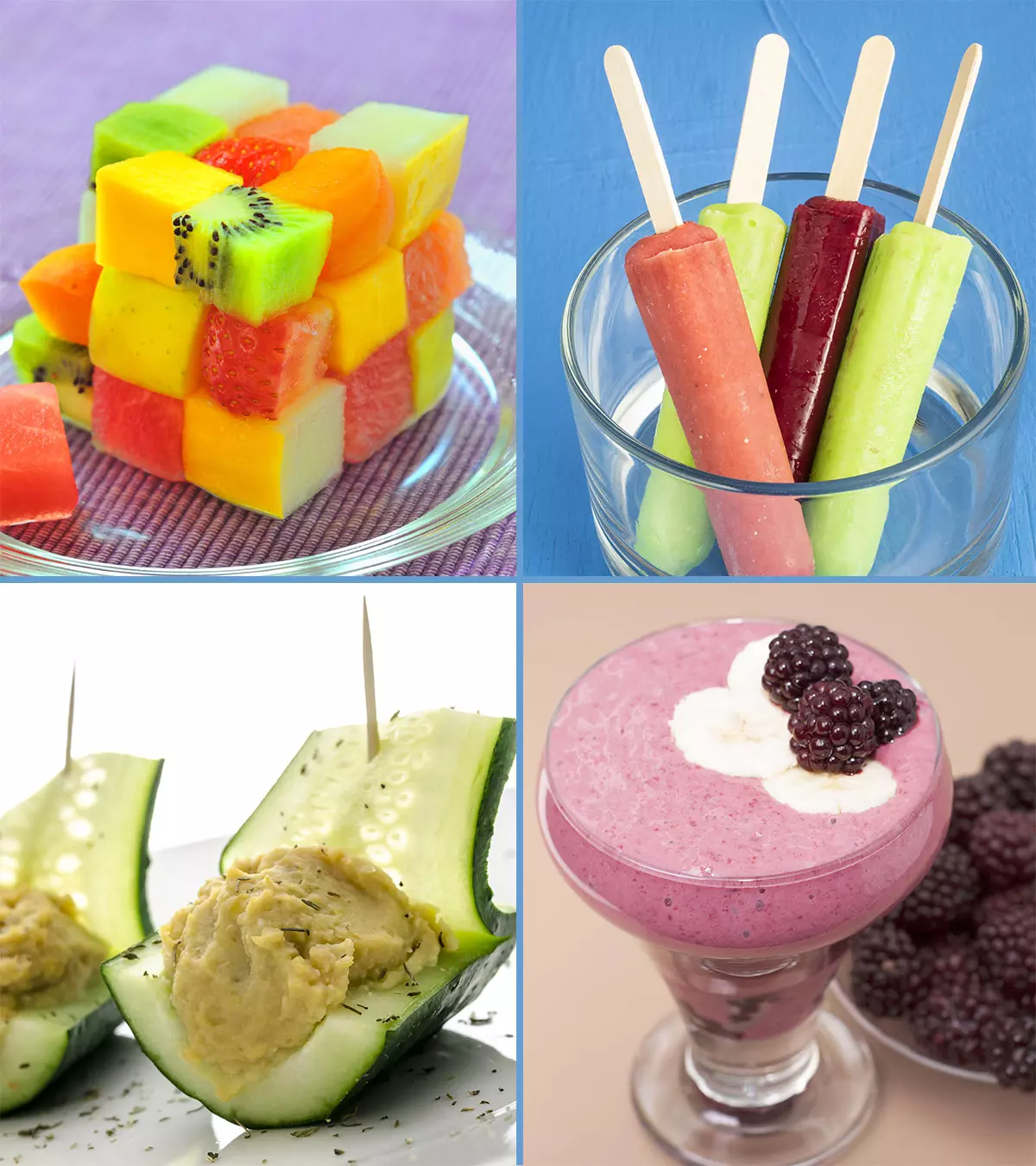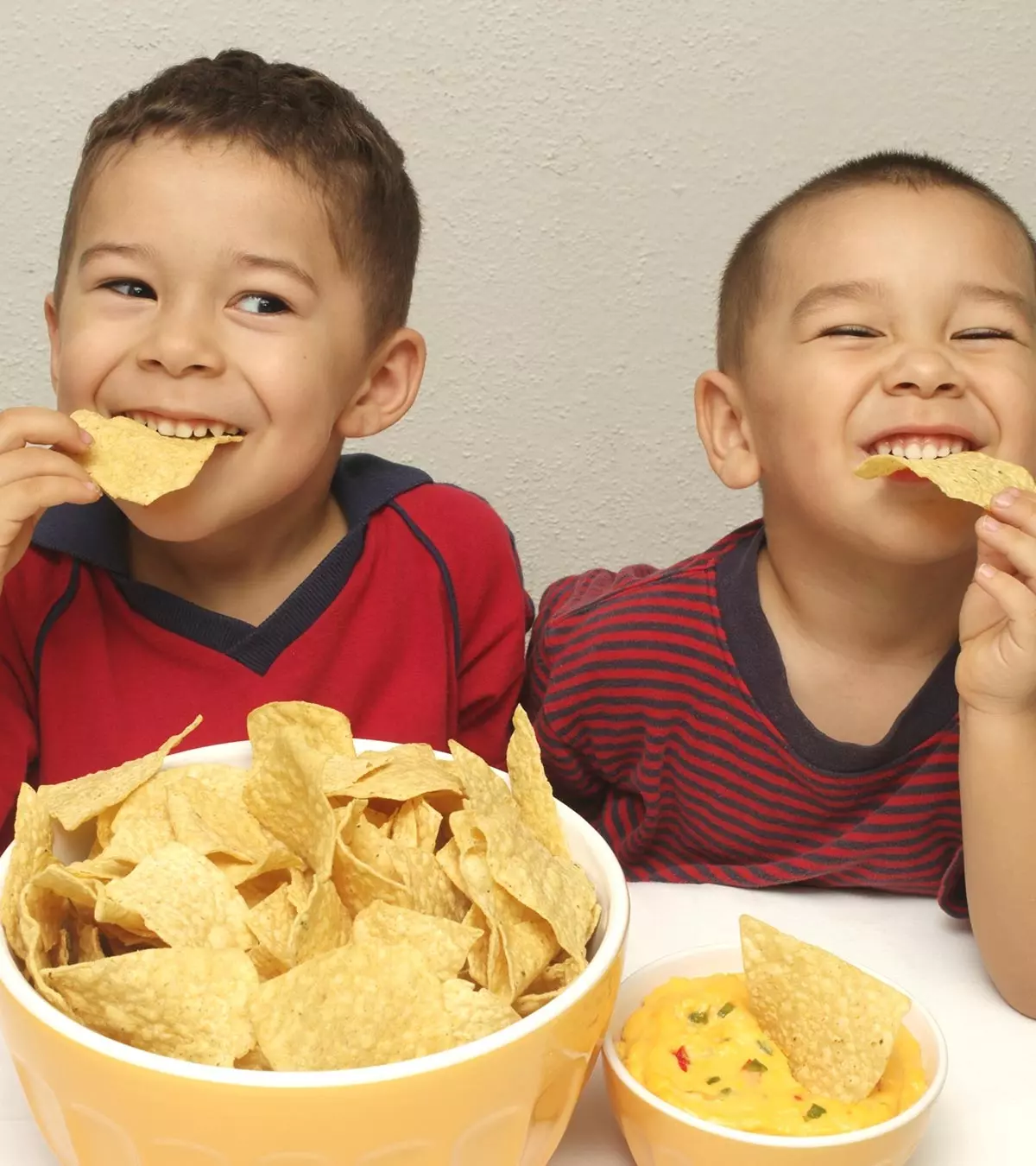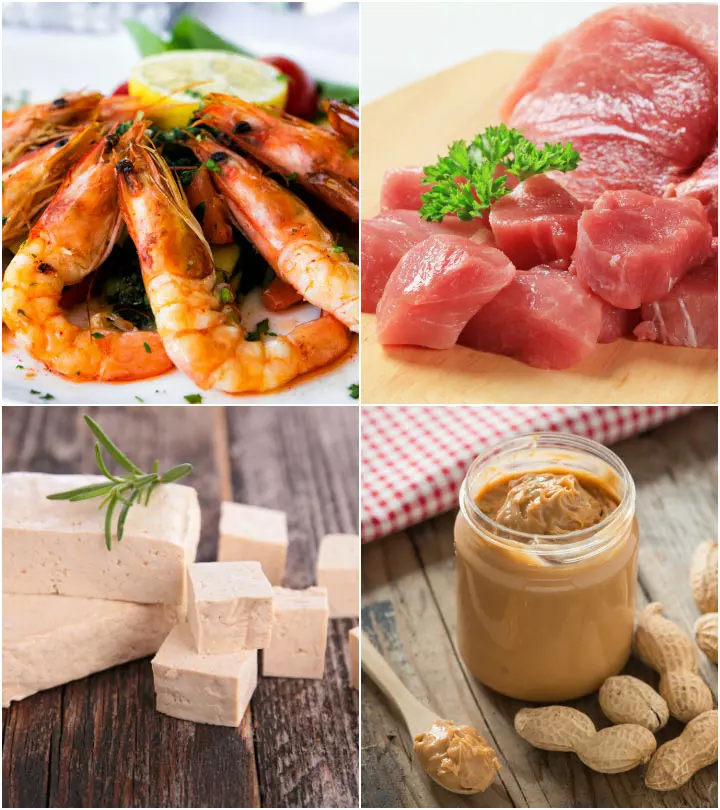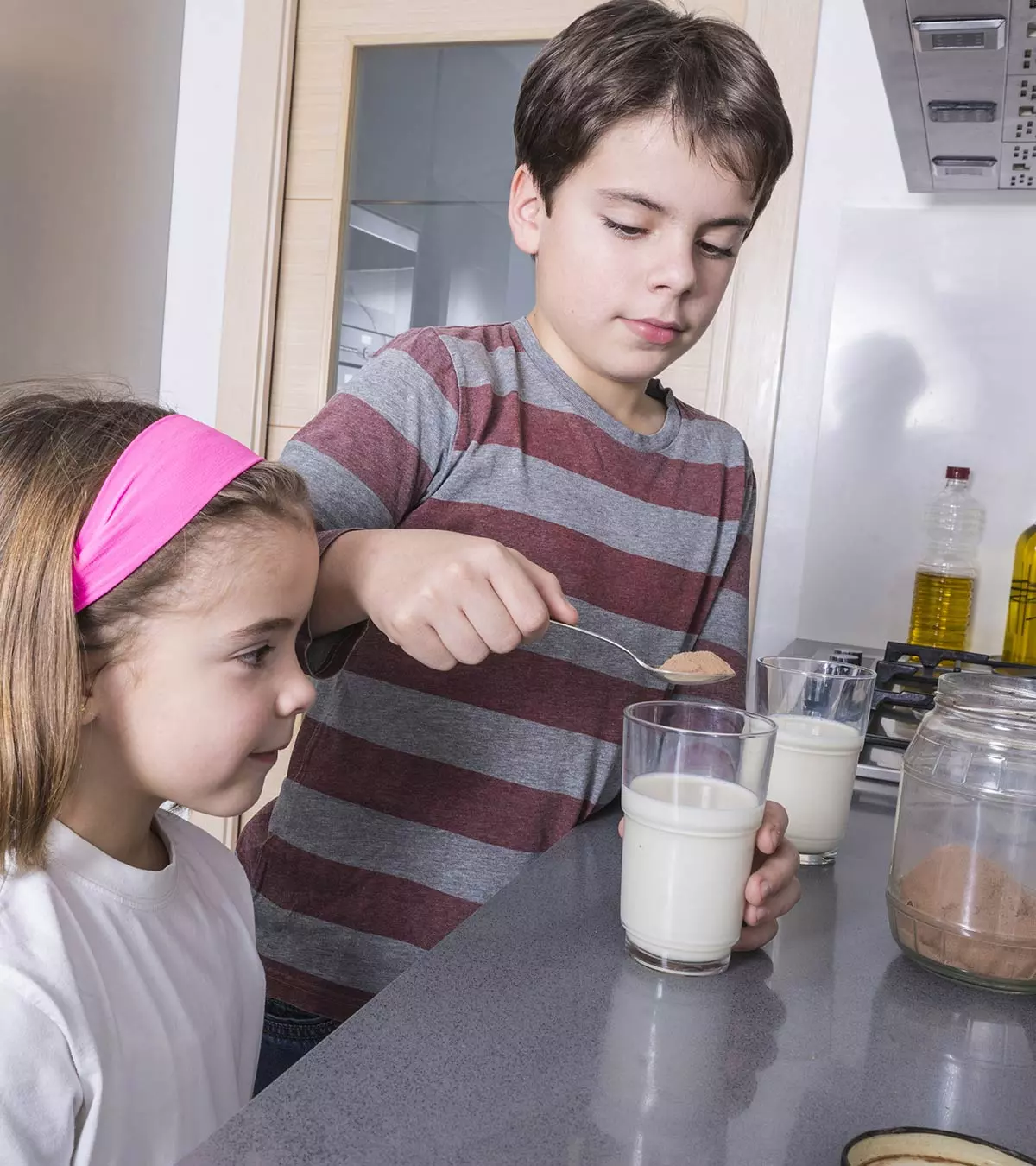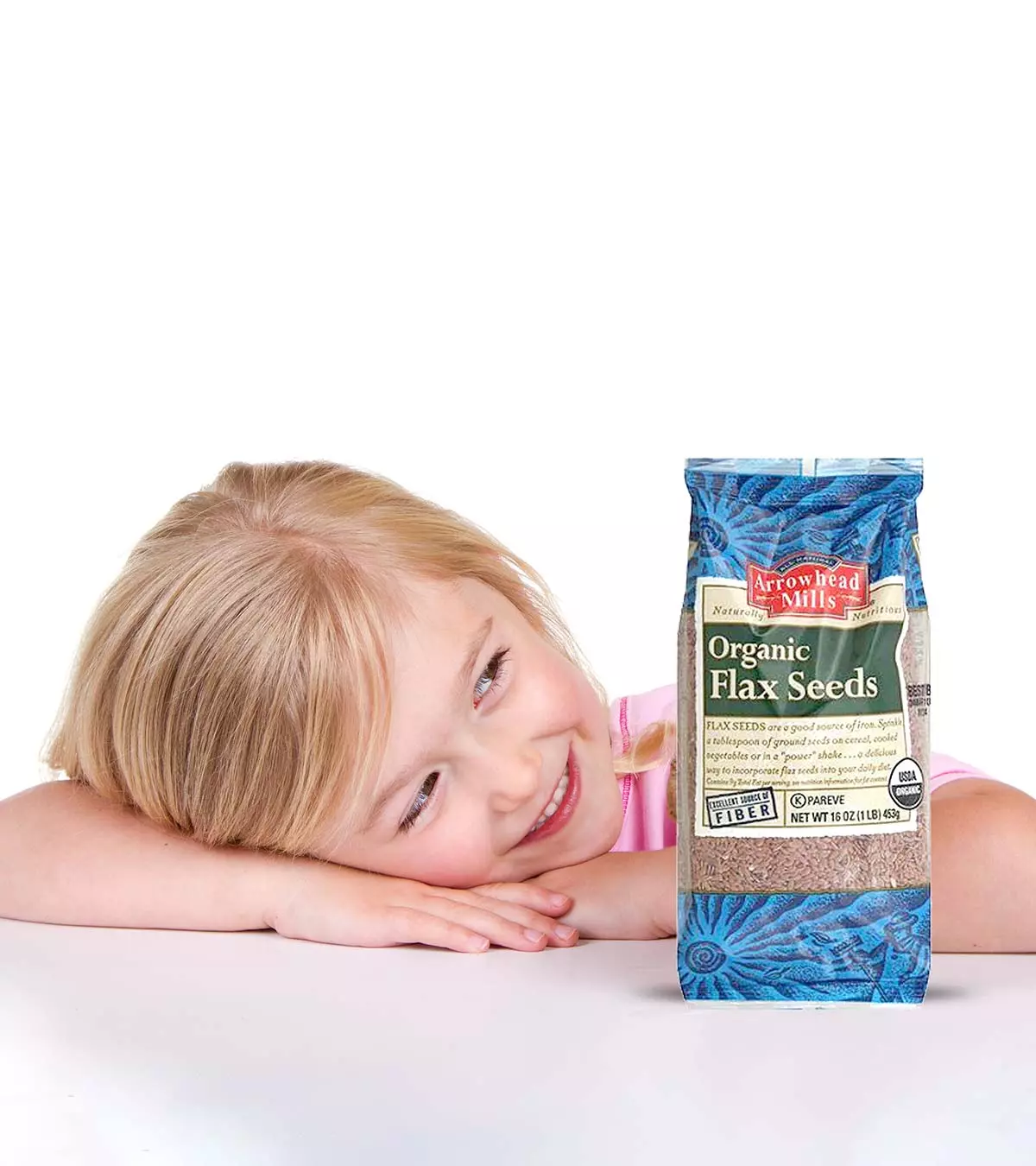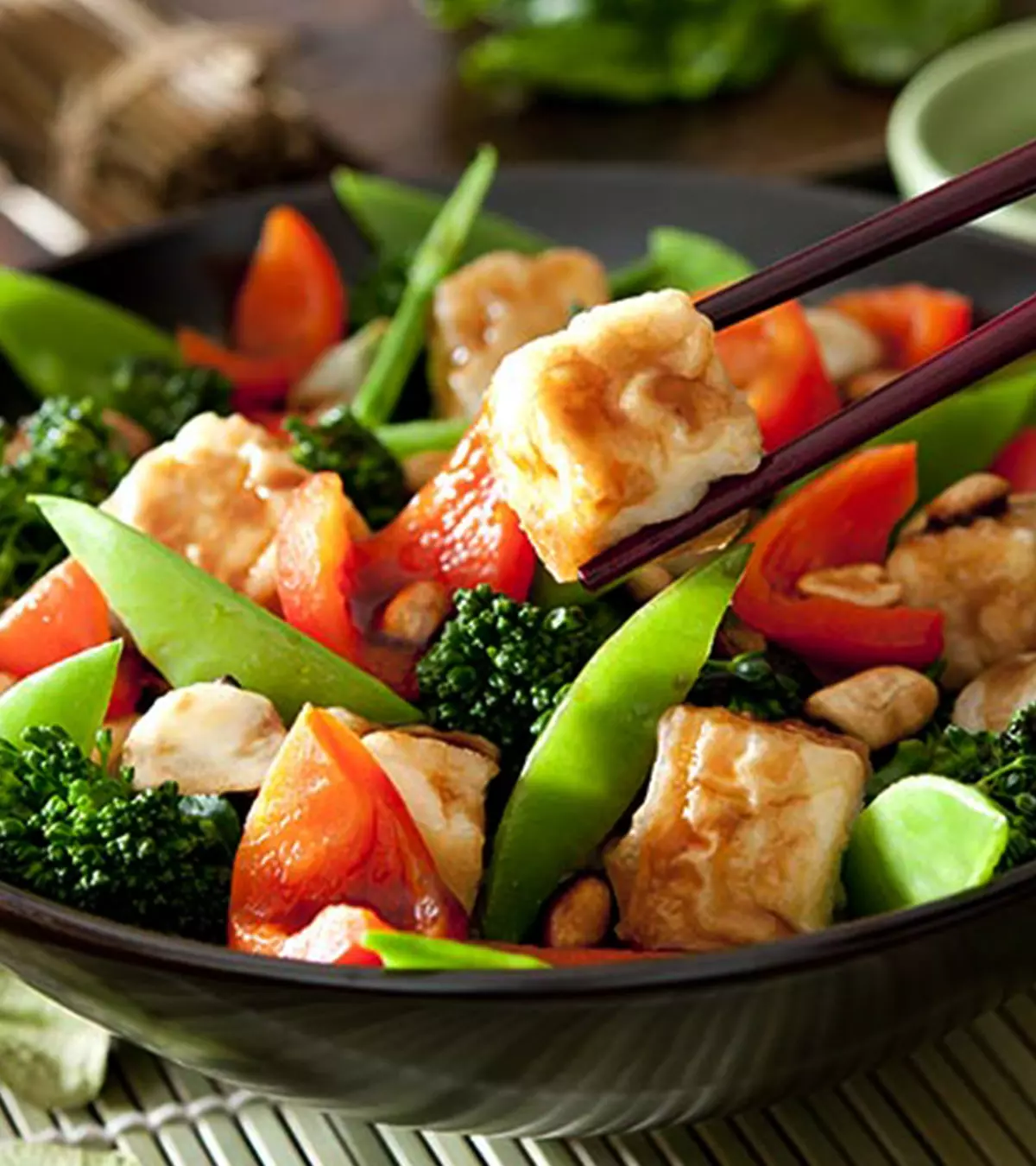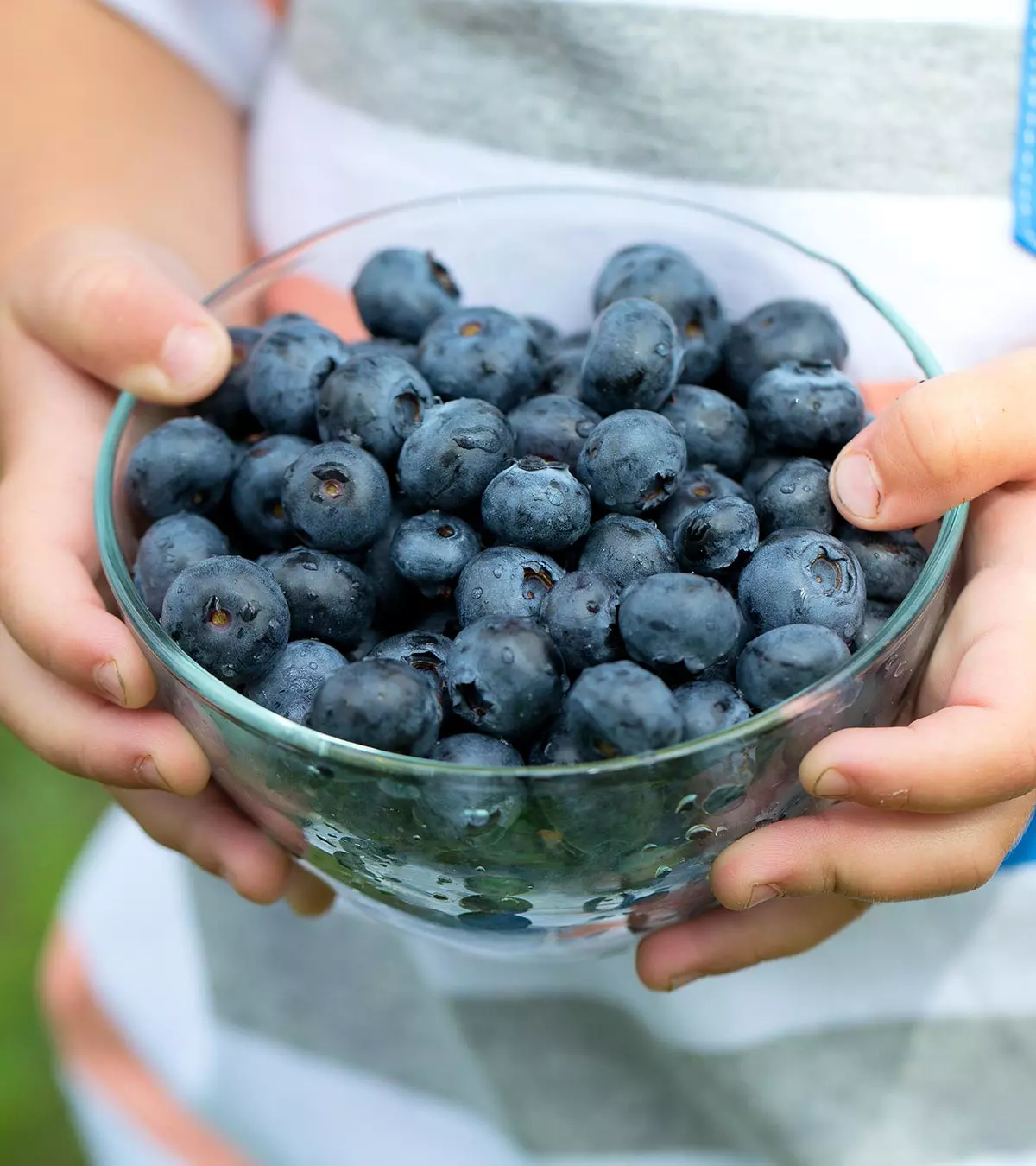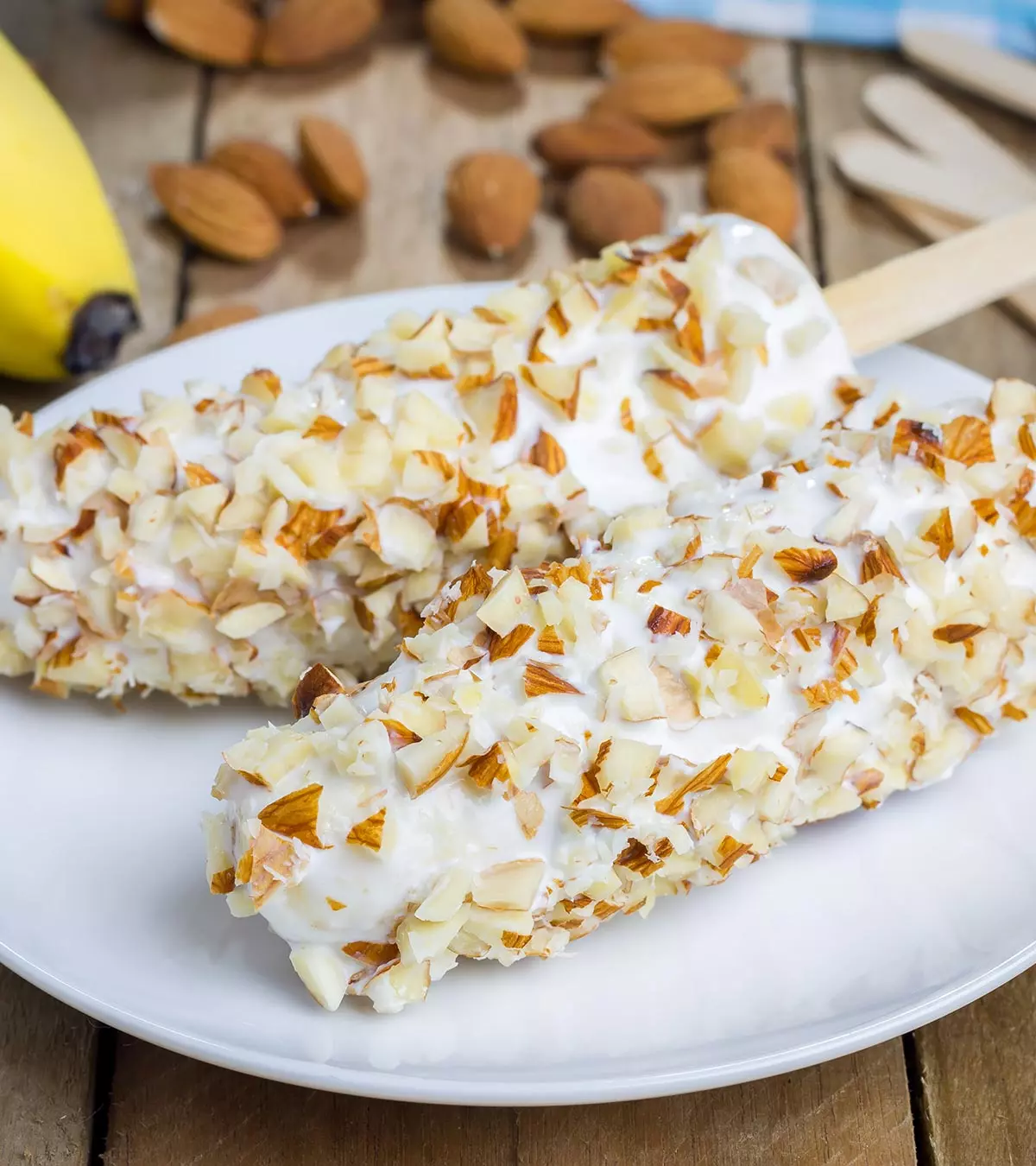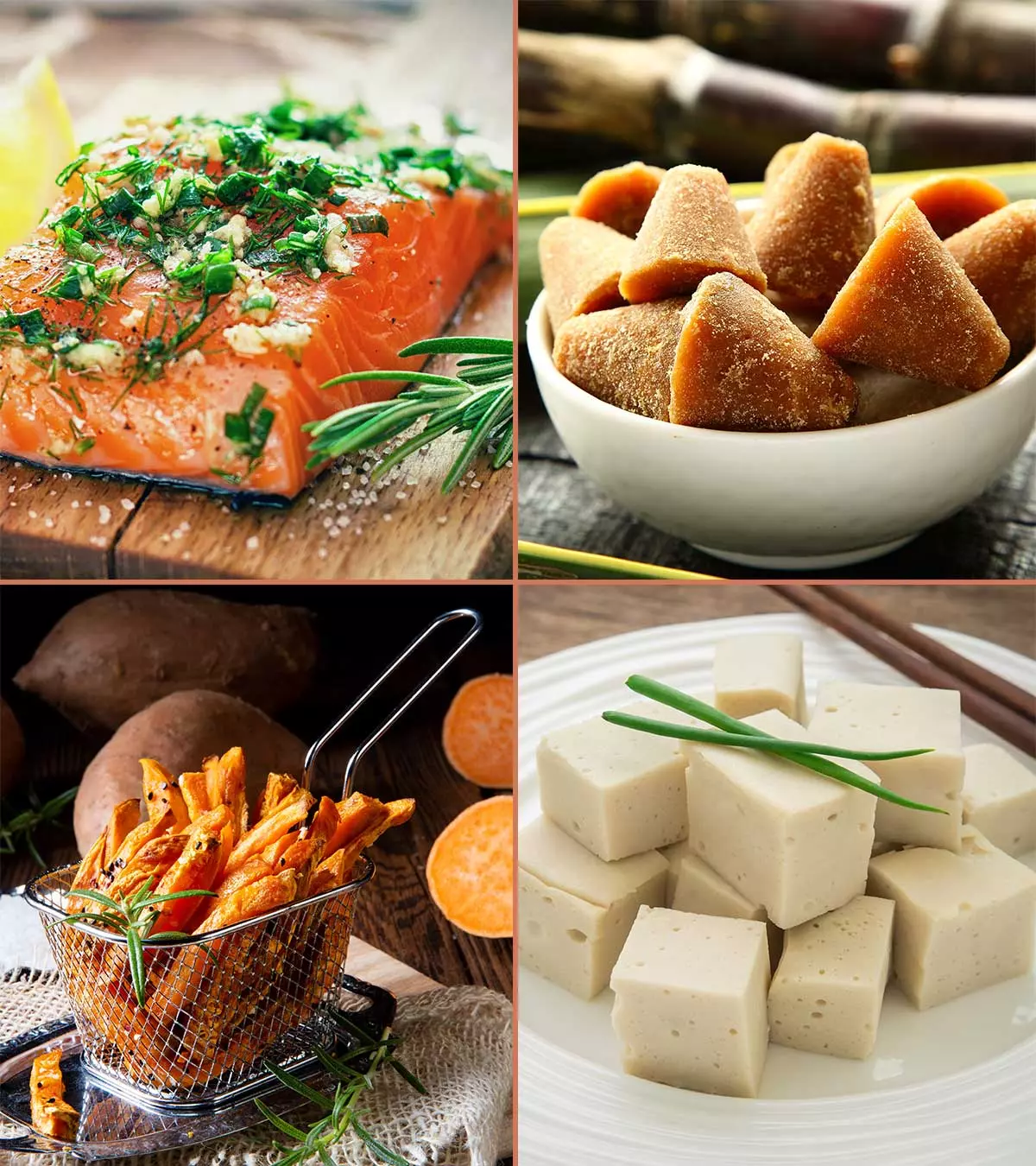
Image: MomJunction Design Team
Underweight children may experience different health issues. That is why it is important to include some weight gain foods for kids in their diet. You may know about the ideal weight your child should have by following the international BMI regulations. The calculation is performed by evaluating the child’s anthropometriciThe study of the human body measurements, particularly on a comparative basis measurements on percentile growth charts. To support your child’s weight gain, understanding nutritious foods and how to include them in meals is essential. This post will help you provide the right nutrition to your children through some of the most nutrient-dense best foods. These will help them gain a healthy weight at a stable rate while providing them with all the essential nutrients for growth. Although most gradually gain the right weight as they grow, some may not achieve that. Weight gain can be influenced by other factors such as genetics, regular activities, or other underlying issues. Hence, it is important to remember that food may not always be the solution or the problem, so you do not end up overfeeding your child.
Key Pointers
- The ideal weight for a child can be determined using BMI-for-age percentile growth charts.
- It is advisable to consult a pediatric dietitian to develop a comprehensive diet plan for optimal weight gain.
- Children should have regular meals along with at least two calorie-rich and nutritious snacks every day.
- Choosing foods that contain essential nutrients such as protein, iron, calcium, and vitamins is crucial for children.
- Healthy options for promoting weight gain in children include, eggs, chicken, salmon, tofu, jaggery, honey, and nuts.
What Should Be The Ideal Weight For Children?
According to the US Centers for Disease Control and Prevention, for children over the age of two years, the ideal weight of children can be measured by their BMI-for-age percentile growth charts (1).
| BMI percentile | Weight status |
|---|---|
| Less than 5 | Underweight |
| 5 to 85 | Normal weight |
| 85 to 95 | Overweight |
| 95 and above | Obese |
Whereas children should be given nourishing foods for their overall growth and development. Weight gain foods for kids are specifically for those who are underweight. Despite the growing obesity trend in general, some children tend to be underweight due to a lack of access to sufficient food. A report published by The World Bank suggested a 0.4% prevalence of underweight children in the US in 2018 (52). The choice of foods in such cases thus gets tricky, so it is always advisable to consult a pediatric nutritionist to plan a holistic diet for weight gain.
 Experts say
Experts sayInfographic: Foods For Healthy Weight Gain In Children
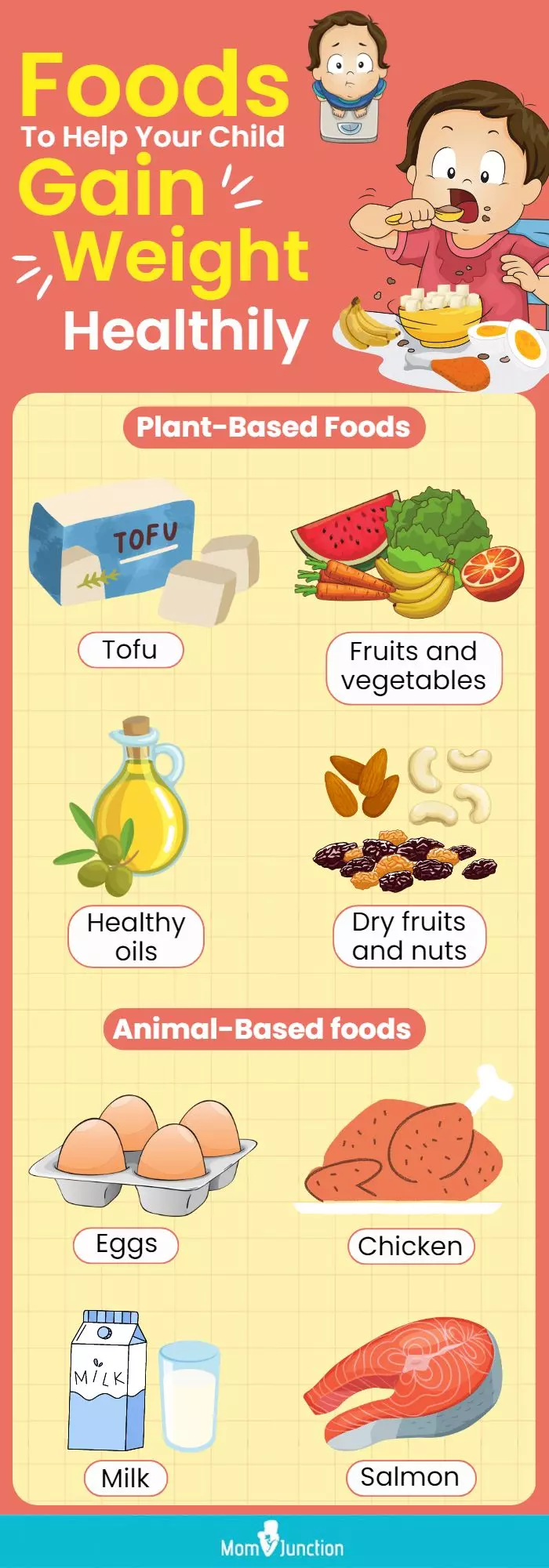
Illustration: Momjunction Design Team
25 Healthy Weight Gaining Foods For Children
Weight gain foods for kids should be wholesome as well as mouth-watering. Whether it is an energy bar, a smoothie, or a whole meal, your children will enjoy it only if it appeals to them. Do not forget to include these nutrient-dense foods in your meal planning for weight gain in children.
1. Eggs
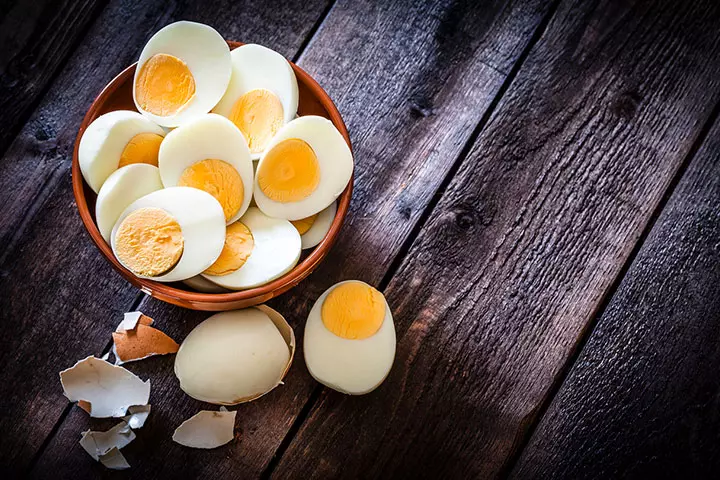
Wholesome and rich in protein, eggs can help in regulating your child’s weight. An egg helps in building the growth of muscles and tissues of the body, that are essential for puberty and good adolescent health. Eggs should be boiled well and introduced in small quantities to young children. Eggs are a superfoodiFoods high in fiber, antioxidants, or fatty acids that are beneficial for health for children and are packed with many nutrients such as phosphorus, complete protein, zinc, calcium, iron, selenium, vitamin A, vitamin B12, vitamin B6, vitamin D, vitamin E, vitamin K, riboflavin, and choline (3).
Nutritional value per egg (4):
| Energy (Kcal) | Fat (grams) | Protein (grams) |
|---|---|---|
| 78 | 5 | 6 |
2. Chicken
Chicken is a high-calorie and high-protein food for children and can help prevent malnutrition. It is also rich in phosphorus, an essential mineral that supports your teeth and bones, and benefits the kidney, liver, and the functioning of the entire central nervous system. It is also a great source of vitamin B12, a key nutrient for proper brain, nerves, and blood cell development, especially at early ages (45). Remember that chicken breasts are leaner than thighs and legs and that removing the skin is the best option because it’s rich in saturated fats and cholesterol.
Nutritional value per 100g of chicken (5):
| Energy (Kcal) | Fat (grams) | Protein (grams) |
|---|---|---|
| 239 | 13.40 | 24 |
3. Salmon
Salmon contains omega-3 fatty acids, vitamin B12, selenium, and choline that support brain function, cognitive function, and neurological health in young children. Therefore, cooking a healthy and delicious salmon dish for your little one, sometimes, can be a good idea.
Nutritional value per100g of salmon (6):
| Energy (Kcal) | Fat (grams) | Protein (grams) |
|---|---|---|
| 208 | 13.42 | 20.42 |
4. Tofu
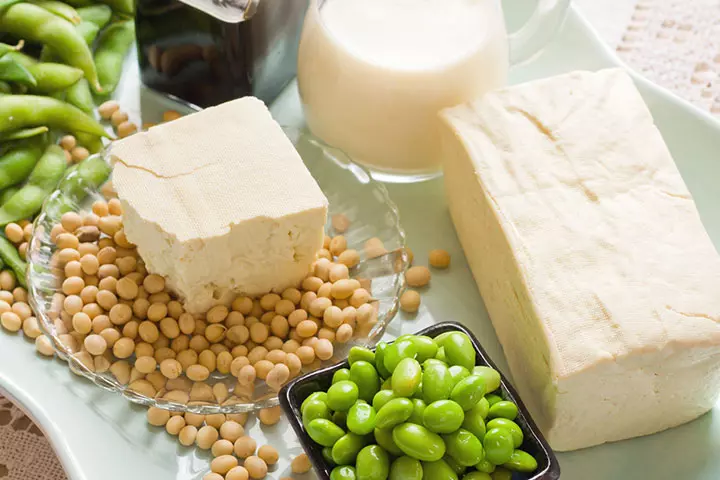
Tofu, a soy product, is a protein-rich food and contains essential amino acids, plant-based iron, calcium, manganese, phosphorus, and selenium. It is a nutrient-dense food item with high protein and healthy fats, both ideal for proper growth in children.
Nutritional value per 100g of tofu (7):
| Energy (Kcal) | Fat (grams) | Protein (grams) |
|---|---|---|
| 76 | 4.8 | 8.08 |
5. Jaggery
Jaggery is a form of non-refined sugar. Prepared from sugarcane juice and date palm, jaggery is better than refined sugar. It contains essential minerals including iron, which it gathers during the preparation process that involves the use of iron vessels. To provide extra calories to your child’s diet, add organic jaggery to their favorite delicacies. However, do not overuse it as it can have similar side effects as sugar.
Nutritional value per 100g of jaggery (8):
| Energy (Kcal) | Fat (grams) | Protein (grams) |
|---|---|---|
| 383 | 0.1 | 0.4 |
6. Honey
An alternative to sugar, honey comprises 17% water and 82% carbohydrates, promoting healthy weight gain (46). The natural sweetener has a low content of fat. You may add a spoonful on toast, sandwiches, or pancakes while making sure that the total sugar/ sweet intake is within the World Health Organization’s recommended limits of 10% of their total energy intake (47).
Nutritional value per 100g of honey (9):
| Energy (Kcal) | Fat (grams) | Protein (grams) |
|---|---|---|
| 304 | 0 | 0.3 |
7. Milk
Milk and dairy products are a good source of protein. Milk or other dairy products such as yogurt and cheese can serve as quick and filling high-protein snacks for kids. If your child is not lactose intolerant, then one glass of milk every day can help in maintaining a healthy diet (10). Milk contains fats, calcium, and essential vitamins, which help in building strong bones. Plus, milk is fortified with vitamin D in many countries, which improves calcium absorption.
Nutritional value per 100g of milk (11):
| Energy (Kcal) | Fat (grams) | Protein (grams) |
|---|---|---|
| 60 | 3.2 | 3.28 |
8. Yogurt
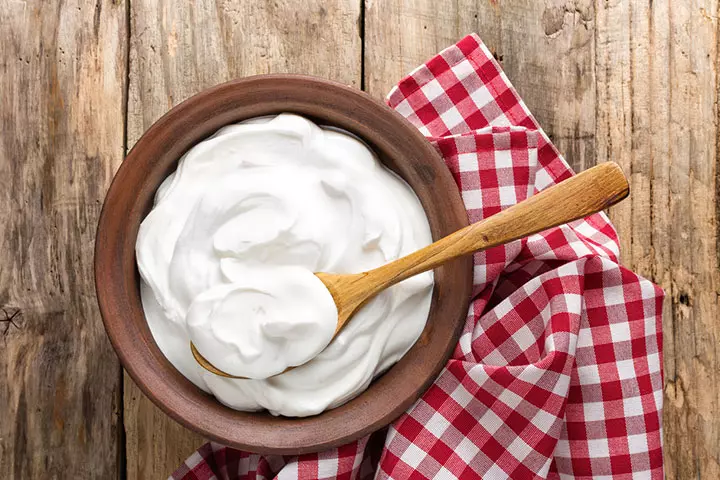
Most children love yogurt. It can be mixed with something or eaten as it is. Calcium and potassium present in yogurt help in improving children’s bone health. In addition, yogurt is a source of gut-friendly bacteria referred to as “probiotics,” which help in proper digestion and absorption (48), thus impacting the overall growth and development of the child. Be sure to choose those with no added sugar for better nourishing your child.
Nutritional value per 100g of low-fat yogurt (12):
| Energy (Kcal) | Fat (grams) | Protein (grams) |
|---|---|---|
| 61 | 0.37 | 10.3 |
9. Dry fruits and nuts
Perfect for snacking or used as toppings, nut butters or on ice creams and smoothies, dry fruits and nuts have a wide variety, such as almonds, cashew nuts, walnuts, apricots, and more. Apart from being rich in iron, vitamins, and magnesium, dry fruits and nuts also provide proteins and healthy fats, which are important for healthy weight gain. You may serve 1 to 2 tablespoons of dried fruits and nuts every day along with other healthy foods for kids.
Nutritional value per 100g of mixed nuts (peanuts, cashews, almonds, hazelnuts, pecans and Brazil nuts) (13):
| Energy (Kcal) | Fat (grams) | Protein (grams) |
|---|---|---|
| 607 | 54 | 20 |
10. Pancakes
Pancakes can be served as yummy snacks or breakfast for children. The ingredients of a pancake make it a high-calorie food.
 Quick tip
Quick tipNutritional value per 100g of pancakes (14):
| Energy (Kcal) | Fat (grams) | Protein (grams) |
|---|---|---|
| 227 | 9.7 | 6.4 |
11. Oatmeal
Whole grains contain carbohydrates, proteins, and starch, making it a good choice for your child. Additionally, its high dietary fiber content helps in digestion.
Nutritional value per 100g of fortified oatmeal (15):
| Energy (Kcal) | Fat (grams) | Protein (grams) |
|---|---|---|
| 68 | 1.36 | 2.37 |
12. Beans and lentils
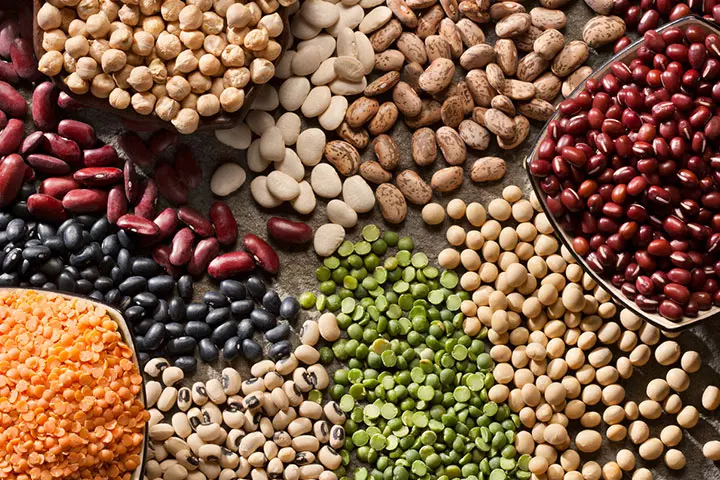
Beans and lentils are rich in protein. On average, every 100 grams of it contains nearly 300 calories. Beans are also an excellent source of soluble fiber, which regulates blood sugar and helps prevent constipation (49). Plus, beans and lentils are rich in phytonutrients and antioxidants, which are key for good health. If your child is a fussy eater, try feeding them beans cooked in their favorite style.
Nutritional value per 100g of beans and lentils: (16) (17):
13. Olive oil
Use olive oil as a salad dressing or to sauté any food item. This oil is rich in monounsaturatediA type of beneficial dietary fat fats, antioxidants, and a wide array of vitamins, such as vitamin E, which is vital for a healthy immune system and helps with children’s neurological development (50). You may try the extra virgin olive oil.
Nutritional value per tablespoon of olive oil (18):
| Energy (Kcal) | Fat (grams) | Protein (grams) |
|---|---|---|
| 119 | 13.5 | 0 |
14. Banana
Bananas are packed with nutrients that help in easy digestion. They are high in fiber, potassium, magnesium, and vitamin B6, which make them one of the best high-calorie foods for kids. The fruit is thus ideal for weight gain in kids.
Nutritional value per medium-sized banana (19):
| Energy (Kcal) | Potassium (grams) | Protein (grams) |
|---|---|---|
| 105 | 0.4224 | 1.3 |
15. Avocado
They are high in vitamins C, E, K, and B6, potassium, fat, fiber, Avocados also provide lutein, beta-caroteneiA substance present in fruits and vegetables that are yellow or orange, as well as dark green, leafy plants , and omega-3 fatty acids that are beneficial in improving the overall health of the body.
You can blend them into a smoothie or a dip to serve them with fried beans.
Nutritional value per avocado (20):
| Energy (Kcal) | Fat (grams) | Protein (grams) |
|---|---|---|
| 322 | 29 | 4 |
16. Hummus
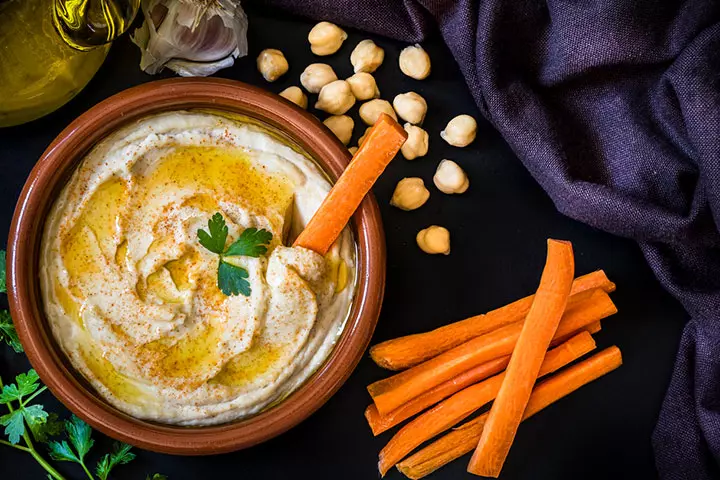
Hummus contains essential nutrients and healthy fats. The main ingredient that goes into making hummus is chickpeas, which is a source of vital minerals such as calcium, iron, magnesium that are beneficial in fighting anemia. It also has a good amount of protein which is important for healthy weight gain.
Nutritional value per 2tbsp (21):
| Kilocalories | Fat (grams) | Iron(mg) |
|---|---|---|
| 77.6 | 5.8 | 0.817 |
17. Corn
Corn is rich in carotenoidsiA collection of around 750 naturally present pigments produced by some types of bacteria, plants, and algae such as lutein and zeaxanthin that promote eye health (51). While it is primarily composed of carbohydrates, it’s also rich in fiber and many essential nutrients for proper growth and development, including B vitamins, iron, potassium, and zinc.
Nutritional value per 100g of corn (22):
| Energy (Kcal) | Protein (grams) | Carbohydrates (grams) |
|---|---|---|
| 86 | 3.22 | 19 |
18. Fruit smoothie
Fruits come in rainbow colors and should be given to children for good health. But do they enjoy eating them as much? They may sometimes become fussy eating whole fruits.
But add a little milk and turn it into a delicious, colorful smoothie; they are sure to love it. Fruit smoothies contain vitamins, minerals, nutrients, and fiber and must be included in the everyday diet. When possible, try to leave the fruit skin on for better nutrition.
Nutritional value per 100g of store-bought smoothie (23):
| Energy (Kcal) | Protein (grams) | Carbohydrates (grams) |
|---|---|---|
| 37 | 1.22 | 8.16 |
19. Sweet potato and potatoes
Sweet potatoes are rich in fiber, vitamins B and C, and minerals such as iron, calcium, and selenium. They are high in antioxidants and improve the absorption of beta-carotene in the body. Oven-baked sweet potato chips or fries are one of the easiest snacks to prepare, and by baking instead of frying them, we avoid unnecessary fats while giving your child nourishing food that can help them gain weight healthily.
Potatoes contain fiber and essential vitamins such as A and C. They are also rich in carbohydrates, which promote healthy weight gain. (24) (25)
Nutritional value per 100g of potatoes:
20. Other fruits
Children enjoy eating yummy, crunchy, and juicy fruits. The fruits strengthen a child’s immune system and help fight against illnesses. Fruits aid in a child’s healthy growth and development as they are high in fiber, vitamins, minerals, and loaded with other nutrients.
Nutritional value for fruits, except limes and lemons (26):
| Energy (Kcal) | Carbohydrates (grams) | Protein (grams) |
|---|---|---|
| 8.37 | 3.60 | 3.36 |
21. Other vegetables
Children may find veggies boring, but they love them if they are tasty and crunchy. If your child is fussy about eating veggies, the best time to give them a plate of vegetables is when they are very hungry. Vegetables contain essential nutrients, including vitamins, minerals, fiber, and antioxidants, that are crucial in improving the child’s health and aiding their overall development (27).
Nutritional value per 100g of vegetables (28):
| Energy (Kcal) | Protein (grams) | Carbohydrates (grams) |
|---|---|---|
| 65 | 2.86 | 13.1 |
22. Peanut Butter
Peanut butter is high in energy, protein, and other nutrients that support healthy weight gain in children. Each tablespoon of peanut butter has about 100 calories, making it easy to increase calorie intake with small portions. Therefore, peanut butter is not just nutritious but also a tasty dip you can serve to your children (29).
Nutritional value per 100g of peanut butter (30):
| ENERGY (KCAL) | PROTEIN (GRAMS) | CARBOHYDRATES (GRAMS) |
|---|---|---|
| 597 | 22.5 | 22.3 |
23. Cheese
Varieties of cheese, including mozzarella, cheddar, and even processed cheese are calorie-dense and are palatable to children. Thus, cheese can help in healthy weight gain while satiating children’s taste buds. Consider incorporating it into your child’s favorite recipes, such as pasta, sandwiches, salad, and soup (31).
Nutritional value per 100g of cheddar cheese (32):
| ENERGY (KCAL) | PROTEIN (GRAMS) | CARBOHYDRATES (GRAMS) |
|---|---|---|
| 403 | 22.9 | 3.37 |
24. Granola
Granola is rich in vital nutrients, such as iron, vitamins, and dietary fiber. It is a nutritious mix of oats, seeds, nuts, and sweetening agents like honey or brown sugar, making it a healthy and tasty snack addition to your child’s breakfast (33). Its high-calorie content also acts as a calorie booster for children and facilitates healthy weight gain. You can either include granola as cereal toppings or add to recipes like muffins and cookies (31).
Nutritional value per 100g of granola (34):
| ENERGY (KCAL) | PROTEIN (GRAMS) | CARBOHYDRATES (GRAMS) |
|---|---|---|
| 464 | 14.3 | 46.4 |
25. Whole Grain Bread
Whole grain bread is a whole-wheat bread containing high amounts of healthy fats and proteins. Bread is an easy breakfast and snack option for children. The less added sugar, higher protein, and more dietary fiber in whole wheat bread make it a nutrient-rich choice for children (35) (36).
Nutritional value per 100g of whole grain bread (37):
| ENERGY (KCAL) | PROTEIN (GRAMS) | CARBOHYDRATES (GRAMS) |
|---|---|---|
| 252 | 12.4 | 42.7 |
Including a variety of these foods into daily meals can ensure your child gets the calories and nutrients needed for healthy weight gain. Aim for a colorful plate to make meals appealing and nutritious.
Why Your Child May Need To Gain Weight
Proper nutrition and maintaining a healthy weight are crucial for a child’s health and development. When children are underweight or malnourished, it can result in various developmental and health problems, including stunted growth, delayed cognitive development, impaired motor skills, and academic performance issues (38). Hence, children should maintain an optimal weight according to their age, height, and body mass index. Here are some potential risk factors for underweight children (39):
- Fatigue
- Malaise
- Anemia
- Low bone mineral density
- Poor digestive health
- Metabolic disorders
In the long term, being underweight can also lead to conditions like hypotension and increased risk of heart diseases later in life. Therefore, if your child is underweight, you may consider these tips to help them healthily gain weight.
Healthy Weight Gain Tips For Kids
Children often gain weight by eating junk, sugary, and processed foods. However, these foods have lesser nutrient content and could lead them to consume extra calories without feeling full. Therefore, it is vital to adhere to healthy weight gain strategies that benefit a child’s overall health. Some useful tips to facilitate healthy weight gain in children include (40) (41):
- Give small and frequent meals, including three meals and two to three healthy snacks daily.
- Limit electronic usage and other distractions while eating to promote mindful eating.
- Be a good role model for healthy eating habits.
- Encourage drinking enough water in between meals and snacks.
- Add calorie-dense meals and snacks to your child’s diet.
- Choose foods containing starchy carbohydrates, such as rice and bread.
- Encourage drinking high-calorie drinks, such as milkshakes, but without sugar.
- Gradually introduce new foods and in smaller portions.
- Involve your child in food preparation to foster healthy eating behaviors.
- Avoid giving unhealthy and processed food and beverages before mealtime.
- Make them exercise regularly to regulate their appetite and boost their metabolism.
Reasons for Insufficient Weight Gain in Children
There can be several reasons for a child not gaining sufficient weight. Some of these include (42):
- Low-calorie intake: Insufficient calorie and nutrient intake commonly cause slow weight gain in children. Picky eating and consuming beverages such as milk or sweet juices during mealtime, leaving little room for nutritional foods, are a few prominent reasons for inadequate calorie intake in children.
- High-calorie demands: Very active children and teens and those involved in athletic activities may burn more calories. Hence, if they do not consume enough calories to compensate for the amount of calories they burn, they might not gain sufficient weight.
- Medical conditions: Some health conditions can significantly increase a child’s calories. For example, congenital heart disease accelerates metabolism and causes the heart to beat faster to meet the body’s demands. It means the child will need more calories to meet the increased demand. Alternatively, certain health conditions such as celiac disease or cystic fibrosis might impair the body’s ability to absorb nutrients from diet. If the child doesn’t eat more calories, they may not gain enough weight.
- Feeding difficulties: Difficulty swallowing or aversion to certain textures are a few feeding problems that can affect a child’s ability to consume enough calories. It is another reason that they may not gain enough weight.
Frequently Asked Questions
1. How can I make my child gain weight fast?
The key to making your child gain weight fast is incorporating ingredients rich in protein and fat into their diet. You could include protein sources on a plain sandwich or add cheese to their omelet. Similarly, add whole milk, pasteurizediA heat-treatment technique that destroys harmful bacteria from foods and drinks cheese, whipped cream, and other milk products to suitable dishes. Serve them nuts and seeds as snacks. Try to increase their meal frequency without inconveniencing them (40).
2. Do children gain weight before they grow in height?
Children might appear to gain weight before their height spurts since the excess fat stored in the body contributes to height growth (43). You may offer a diet with some nutritious foods to increase height in kids.
3. How can I encourage my child to eat more calorie-dense foods?
Provide calorie-rich foods like avocados, nut butter, whole milk, yogurt, cheese, whole grains, and lean meats across meals and snacks. Offer frequent meals containing calorie-dense foods from different food groups. Eat as many meals as possible with your child to set the right examples and encourage them to eat calorie-rich foods (31).
4. Are there any foods that should be avoided when trying to help a child gain weight?
Sugary beverages, such as fruit juices, processed junk food, foods made with refined grains, and high-calorie foods low in nutrients, such as chips, candies, and cookies, are some foods children should avoid when trying to gain a healthy weight.
5. How can I create a healthy and balanced meal plan for my child to help them gain weight?
Consult a pediatrician or a registered dietitian for a customized diet plan for your child based on their specific needs. Ensure your child’s meal plan provides adequate calories to support weight gain. Include nutrient-dense foods rich in healthy fats, complex carbohydrates, and proteins. Offer frequent meals and snacks throughout the day to ensure the child receives sufficient calories. Regularly monitor your child’s weight gain progress, and adjust the meal plan as needed. Work closely with a healthcare professional throughout this process to ensure its safety and efficacy.
6. Can certain foods or nutrients help with muscle development in kids?
Lean meat, poultry, low-mercury fish, eggs, beans, and nuts are some foods that can help in your child’s muscle development. These foods are also good sources of iron, zinc, and B-vitamins (44).
Children require a wholesome, balanced diet for proper growth and development. Include healthy weight gain foods for kids such as eggs, chicken, milk, yogurt, tofu for proteins, honey, jaggery, fruits, veggies for carbohydrates, nuts, seeds, avocado, and olive oil for healthy fats. Try presenting the food in a visually appealing form to get your child excited. Include a variety of fruits, vegetables, and dishes such as pancakes, smoothies, etc., to make them interesting for kids. And remember that even if your child is underweight, overfeeding is not an option. If good eating habits and lifestyles are not causing healthy weight gain, feel free to consult a pediatrician.
Illustration: Healthy Weight Gaining Foods For Kids
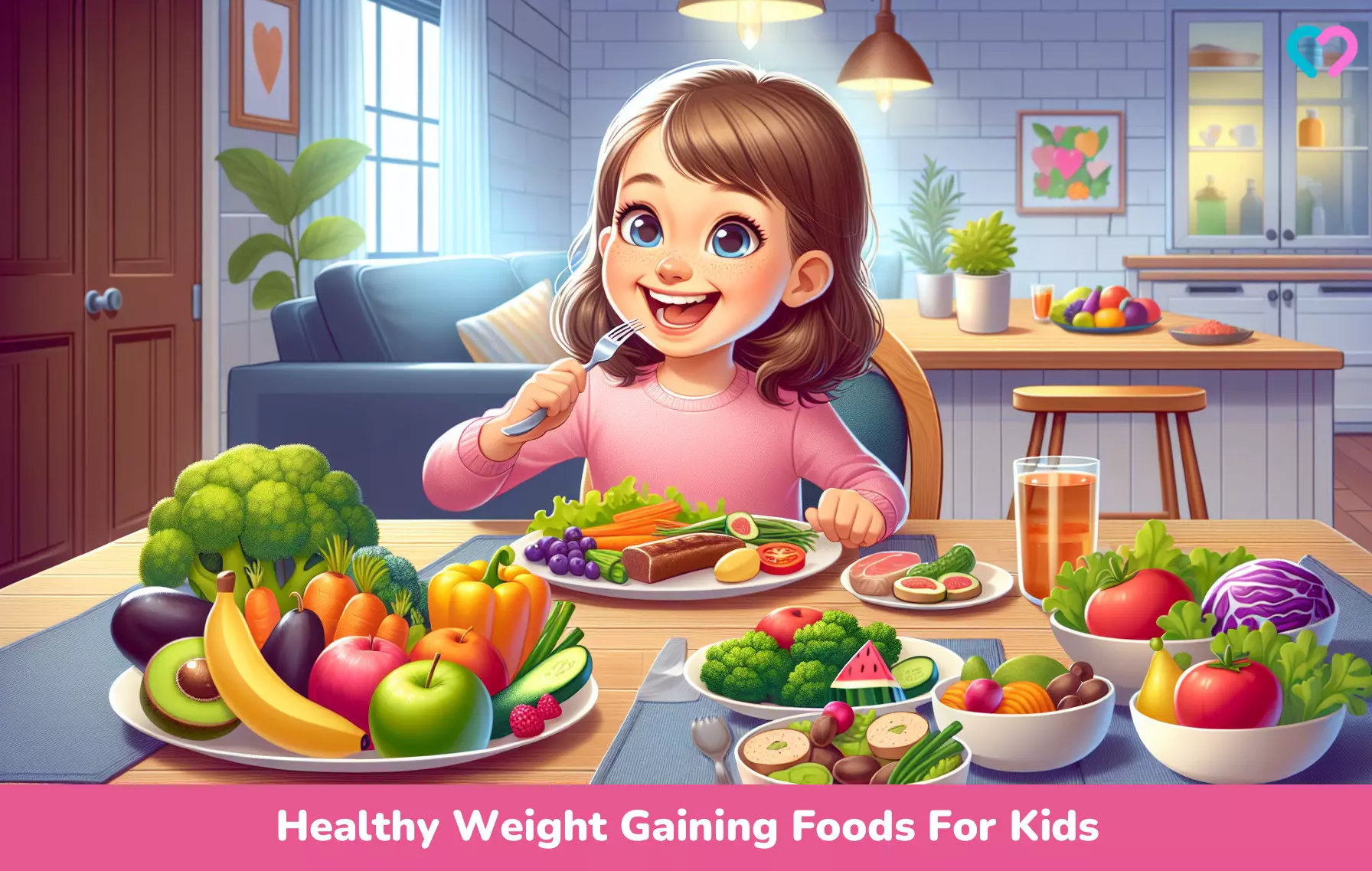
Image: Dall·E/MomJunction Design Team
Discover the top 10 foods that can effectively help increase weight in children. This video offers valuable insights for parents seeking healthy weight gain solutions.
References
- Overweight & Obesity Statistics; NIDDK
- High Calorie Diet; Children’s Wisconsin
- 9 Health Benefits of Eating Eggs for Breakfast; University Of Southern California
- Egg, whole, cooked, hard-boiled; USDA
- Chicken, boiled, feet; Nutritionvalue.org
- Fish, salmon, Atlantic, farmed, raw; USDA
- Tofu, raw, regular, prepared with calcium sulfate; USDA
- Nath A, Dutta D, Pawan Kumar and Singh JP; Review on Recent Advances in Value Addition of Jaggery based Products; Journal of Food J Processing & Technology (2015)
- Honey; USDA
- Nutritional Value of Milk; MOH
- Milk, whole, 3.25% milkfat, with added vitamin D; USDA
- Yogurt, Greek, plain, nonfat (Includes foods for USDA’s Food Distribution Program); USDA
- Nuts, mixed nuts, oil roasted, with peanuts, with salt added; USDA
- Pancakes, plain, prepared from recipe; USDA
- Cereals, oats, instant, fortified, plain, prepared with water (boiling water added or microwaved); USDA
- Beans, pinto, mature seeds, raw (Includes foods for USDA’s Food Distribution Program); USDA
- Lentils, mature seeds, cooked, boiled, without salt; USDA
- Oil, olive, salad or cooking; USDA
- Bananas, raw; USDA
- Avocados, raw, all commercial varieties; USDA
- Hummus, commercial
- Corn, sweet, white, raw; USDA
- Beverages, V8 SPLASH Smoothies, Strawberry Banana; USDA
- Sweet potato, raw, unprepared (Includes foods for USDA’s Food Distribution Program); USDA
- Potatoes, flesh and skin, raw; USDA
- CHAPTER 3: CALCULATION OF THE ENERGY CONTENT OF FOODS – ENERGY CONVERSION FACTORS; Food and Agriculture Organization of the United Nations
- Children’s diet – fruit and vegetables; Better Health
- Vegetables, mixed, frozen, cooked, boiled, drained, without salt; USDA
- How To Increase Calories In Your Underweight Child’s Diet; Cincinnati Children’s Blog
- Peanut Butter; USDA
- Eating to Grow…Tips for Increasing Calories in Your Child’s Diet; Doernbecher Children’s Hospital
- Cheese, Cheddar; USDA
- Y Matsumoto et al.; Effects of Additional Granola in Children’s Breakfast on Nutritional Balance, Sleep and Defecation: An Open-Label Randomized Cross-Over Trial; Children (Basel) (2023)
- Granola; USDA
- Does your child need to gain weight?; Harvard Medical School
- L Ulatowski, & M Marusic; Is Wheat Bread a Better Choice Than White Bread?; Current Developments in Nutrition (2021)
- Bread, Whole-Wheat, Commercially Prepared; USDA
- Ansuya et al.; Effect of nutrition intervention on cognitive development among malnourished preschool children: randomized controlled trial; Scientific reports (2023)
- M. M. Hossain, F Abdulla, & A. Rahman; Prevalence and risk factors of underweight among under-5 children in Bangladesh: Evidence from a countrywide cross-sectional study; PLoS One (2023)
- Weight Gain Tips; Minnesota Department of Health
- How To Help Your Child Gain Weight; NHS
- Why isn’t my child gaining weight? 3 factors that can cause ‘failure to thrive’; University of Texas Southwestern Medical Center
- Weight changes in kids: Knowing when to act, what to say; Children’s Wisconsin
- Nutrition for Growing Bodies; Academy of Nutrition And Dietetics
- Scientific Report of the 2025 Dietary Guidelines Advisory Committee; National Chicken Council
- Jenifer T. Kappico, B.S et al.;Is Honey the Same as Sugar?; University of Arizona (2013)
- WHO calls on countries to reduce sugars intake among adults and children; World Health Organization
- Scientists Reveal ‘One Tablespoon’ Yogurt Addition For Probiotic Boost; College of Agricultural, Consumer and Environmental Sciences
- Fiber: The Carb That Helps You Manage Diabetes; US Centers For Disease Control and Prevention
- Dietary fat; State Government of Victoria
- El-Sayed M Abdel-Aal et al.;Dietary Sources of Lutein and Zeaxanthin Carotenoids and Their Role in Eye Health; Nutrients (2013)
- Prevalence of underweight, weight for age (% of children under 5); UNICEF, WHO, World Bank: Joint child Malnutrition Estimates ( JME)
Community Experiences
Join the conversation and become a part of our nurturing community! Share your stories, experiences, and insights to connect with fellow parents.
Read full bio of Eva De Angelis
Read full bio of Swati Patwal
Read full bio of Rohit Garoo
Read full bio of Shinta Liz Sunny











